On July 23, ZJU International Summer School 2021 for Machine Learning and Data-driven Decision Management—the 7th Zhejiang University Graduate Summer School was successfully concluded online.

Jointly held by School of Management at Zhejiang University (ZJU-SOM), International Research Center for Data Analysis and Management of Zhejiang University, and ZJU-SOM Department of Data Science and Management Engineering, the program invited Prof. Alvin Leung from the City University of Hong Kong, Prof. Yifan Feng from National University of Singapore, Prof. Ruxian Wang from Johns Hopkins University Carey, Prof. Ben CF Choi and Prof. Qinshen Tang from Nanyang Technological University and Prof. Ming Hu from University of Toronto as speakers to give presentations and share ideas regarding their academic research fields. Over 1000 participants joined in this academic feast and they were greatly benefited in this program.
Prof. ZHOU Weihua, Associate Dean of ZJU-SOM and Director of International Research Center for Data Analysis and Management of Zhejiang University, delivered his welcome and hoped that the program could offer a platform for lecturers and students to seek advice from experts regarding their academic questions, and to have close mutual communication from multiple perspectives as well. More importantly, he hoped that the program could make a contribution to the development and innovation of the discipline.
Prof. CHEN Xi, Prof. YANG Yi, Assistant Prof. ZHANG Zheng, Associate Prof. TONG Yu, Assistant Prof. PENG Xixian and Associate Prof. JIN Qingwei from ZJU-SOM took turns as moderators during the program. Lets have a recap of the speakers’ excellent sharing.
Prof. Alvin Leung-Search Networks and Investment Habitats
Online users often leave their digital footprints on infomediaries. Such data are useful to understand user preferences before transactions have been taken place. By making use of aggregate search data in finance portals, Prof. Leung introduced how to use business analytics to derive search networks from the data as well as how to use the networks to identify groups of stocks of interest to users. Prof. Leungs careful explanation and incisive answers left a deep impression on everyone.

Prof. Leung answered the questions after lecture
Prof. Yifan Feng-Introduction to Portfolio Management: Model- and Data-driven Methods
Prof. Yifan Feng first reviewed the classic theories and models for portfolio management in the short course, including modern portfolio theory (MPT), capital asset pricing model (CAPM), and factor models. Then he discussed the estimation issues, a big hurdle in practical portfolio construction. To overcome this hurdle, he also introduced a series of tools for parameter estimation and portfolio construction. A portfolio manager could use these tools to balance the tradeoff between model risk and sample risk and eventually mitigate the estimation issues. In the end, he discussed dynamic portfolio construction strategies, which inspired students in this field to a great extent.
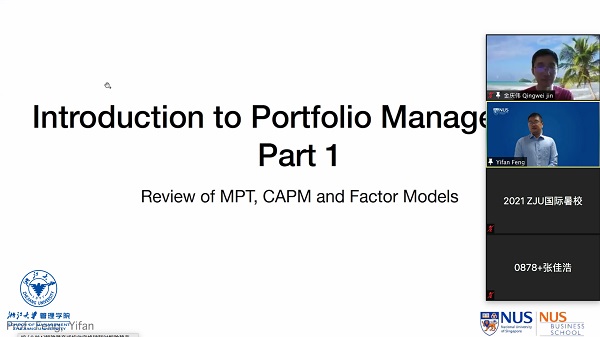
Prof. Feng shared his research
Prof. Ruxian Wang-Consumer Choice and Revenue Management: Modeling, Optimization and Estimation
Prof. Wang Ruxian analyzed how customers chose the "optimal product" from the perspective of customers purchasing behavior. He first reviewed the customer choice models commonly used in academia and the industry, and then considered how to build new models to depict different customers buying behaviors. Category pricing management has a very wide range of applications, including product design and promotion, wholesale and retail, product content ranking, personalized product recommendation, etc. Therefore, his research considers the different situation comprehensively, establishes the business decision optimization model, and proposes the new real-time effective solution algorithm and the problem solution.
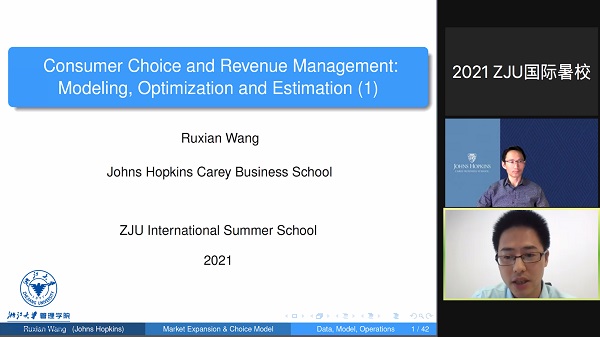
Prof. Wang shared his research
Prof. Alvin Leung-Quantification of Market Value of Security Investment
Information security investment generates intangible assets for firms, which is difficult to quantity its market value. In this workshop, Prof. Leung introduces two novel empirical methods, namely, event study methodology and calendar portfolio approach, to quantify such values in both short and long terms. Such methods can be applied to other types of business investments to understand their intangible business values and facilitate senior management to make better investment decisions.
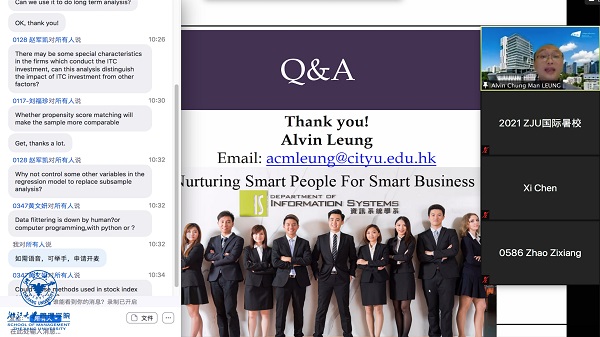
Prof. Leung answered the questions after lecture
Prof. Ben Choi-Activity Tracking, Fitness, and Sustainability
Recognition of performance is broadly known to be important to drive improvement and behavior changes. However, individuals can be overwhelmed by not only their performance information, but also that of others. Consequently, individuals might become reluctant to take part in further performance evaluation. Under this background, Prof. Choi provided a brief discussion on the latest development in human-computer interaction designs by using activity tracking technologies to motivate fitness behaviors and sustainable consumption behaviors. Prof. Choi mainly shared two recent studies. One was cultivating sustainable behavior with persuasive visualization, and the other was relative evaluation on social fitness apps, and studies how psychological need satisfaction and psychological need frustration form on social fitness apps. Prof. Choi pointed out that relative evaluation on social fitness apps did not have influence on users’ behavior, and app designers and app providers should exercise greater prudence in recommending strategy. Additionally, Prof. Choi presented his findings of a completed study on the effects of activity tracking on fitness behaviors as well as discussing a developing study on designing visualization to promote eco-driving.

Prof. Choi shared his research
Prof. Ben Choi-Misinformation in the Covid Pandemic - Insights with Machine Learning and Artificial Intelligence
The COVID-19 pandemic has made people grow more reliant on social media for information and socialization. However, this virtual haven is increasingly overtaken by a massive infodemic. Prof. Choi presented a study aiming to unveil an unseen digital resilience stemming from individuals’ elevated dedication to safeguarding collective wellbeing. This study disentangles the roles of viral appeals on this communicative defense against misinformation proliferation and highlights the impact of digital resilience on the alignment of community mobility with government interventions. Results show individuals indeed refrain from sharing misinformation with informational appeal.
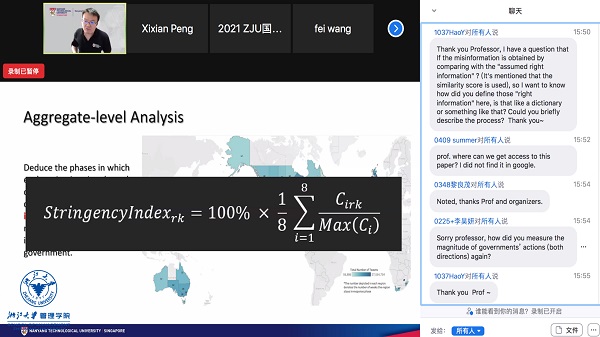
Prof. Choi answered questions after lecture
Prof. Ming Hu-From the Classics of Newsvendor and Queueing to New Tunes in Social Operations
Prof. Hu discussed three new developments in social operations management built upon the classical newsvendor and queueing models. First, he introduced the research area of OM and summarized some important characteristics for a good stylized model. In his first research, Prof. Hu focused on the Potty Parity problem. He derived a queuing model that addressed the inequitable access by women and the LGBTQ community to public restrooms. In his second research, he considered a socially responsible news-vendor that was concerned with its profit as well as consumer surplus. At last, he studied a network of socially connected newsvendors and briefly analyzed its effects. Prof. Hu’s attractive speech and his frequent interaction with audiences benefit the students a lot.
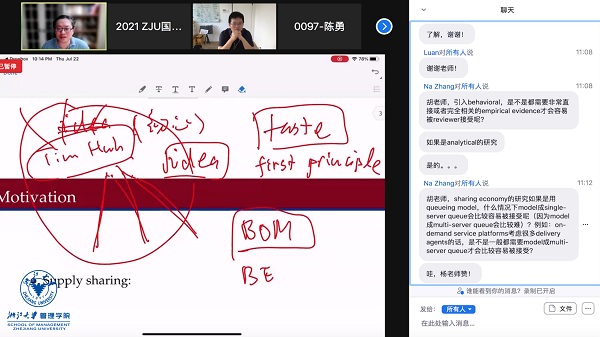
Prof. Hu answered the questoins after lecture
Prof. Qinshen Tang-Joint Prediction and Optimization
The two-stage “predict then optimize” problem are widespread in the researches of data driven inventory, portfolio and transportation routing. Separating the process of prediction and optimization always cause the trade-off between the predicated accuracy loss and the sub-optimal in decision. Prof. Tang focused on jointing these two processes. He then presented a collaborative research approach “Decision-Driven Regularization: A Mixed Model for Forecasting-then-Optimization (DDR)”, joint working with Gar Goei Loke and Yangge Xiao, after summarizing the state of art researches, such as the SPO+(Elmachtoub and Grigas, 2020)and JERO(Zhu et al., 2020). This approach introduced regularization method to propose a blended predict-then-optimize framework that might lead to biased predictions on the outcome with tractably incorporating the optimization problem into the prediction stage, in order to guarantee the robustness of decision result and reserve the correct trend of predicted function simultaneously. The equivalent or naturally approximation proposition between DDR and three perspectives, namely the regularization, the robust optimization, and the regret minimization approaches has been proofed. Numerical showed the outperform of DDR in low mis-specification and nonlinear cost function, compared with SPO+ and JERO.
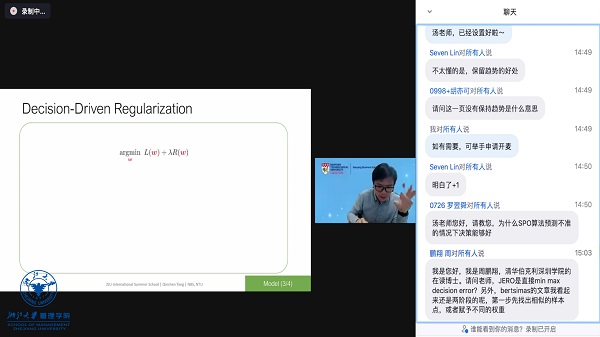
Prof. Tang answered questions after lecture
ZJU-SOM is committed to building a high-quality academic cooperation platform, where the participants could have close academic discussions with experts and scholars in the field.
Source: International Research Center for Data Analysis and Management of Zhejiang University